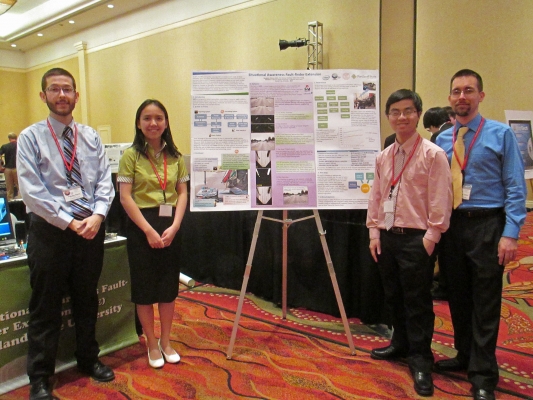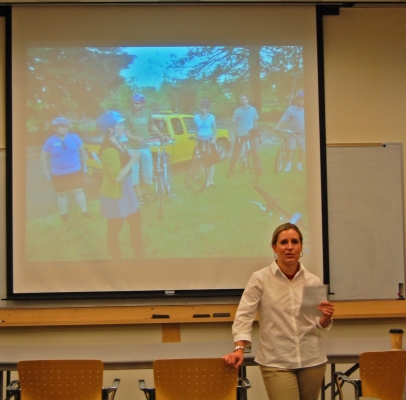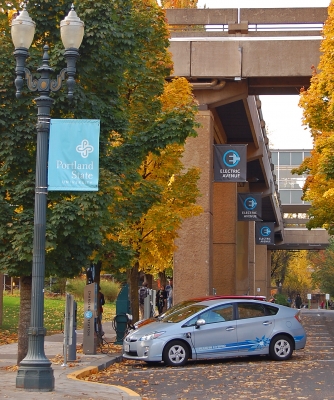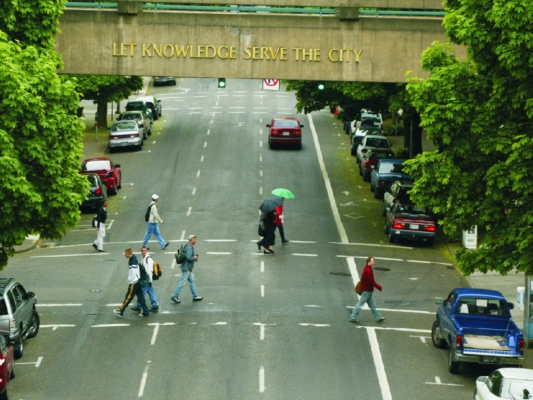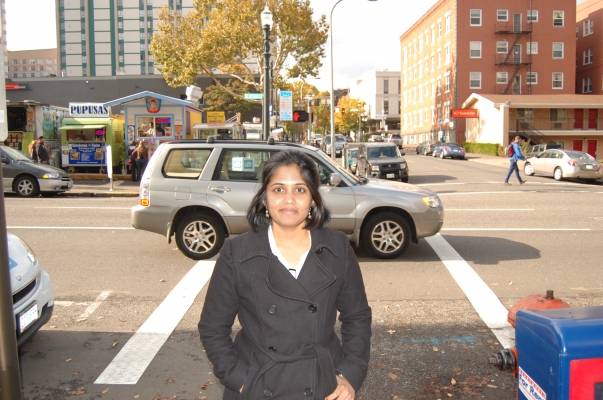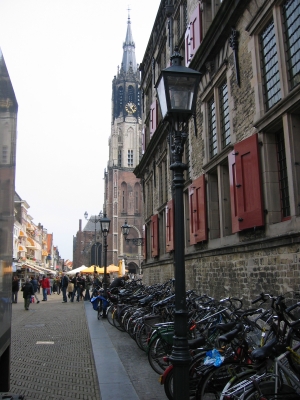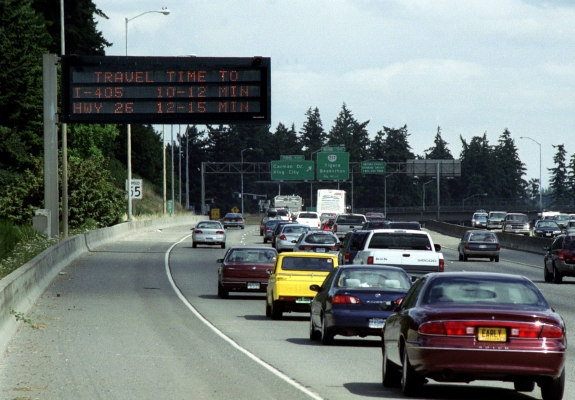With the emergence of electric vehicles (EVs) as an environmentally friendly alternative to the internal combustion engine, OTREC researcher Robert Bass decided to investigate some of the uncharted effects of their growing prevalence.
Bass is interested in measuring and understanding the impacts that electric vehicle charging stations have on their cities’ power distribution systems.
Electric Avenue, located on the Portland State University campus where Bass is an associate professor, is the perfect research opportunity: a row of EV charging stations along Southwest Montgomery Street, between Broadway and Sixth Avenue in downtown Portland, Ore.
Launched in August 2011 as a joint project by Portland General Electric, PSU and the City of Portland, Electric Avenue is intended as a research platform for understanding the impact EVs have within the larger context of the city.
Nonlinear loads such as EV chargers can introduce power quality issues to a city’s electricity distribution system. Bass, with PSU undergraduate student Nicole Zimmerman, set out to measure the power quality effects of EV chargers along Electric Avenue.
Power quality manifests in several ways; for this study, the researchers focused...
Read moreOTREC research from Portland State University has developed a new method of travel demand modeling for pedestrian trips.
Transportation professionals use travel demand modeling to forecast how many people will be using a given portion of the transportation infrastructure. This is typically done using a four-step process, the first step of which relies upon a basic unit known as a transportation analysis zone, or TAZ.
A TAZ is a relatively coarse unit of space that can vary in size depending on planners’ needs; typically it encompasses somewhere around 3,000 residents.
Planners started using TAZs in the 1950s, on mainframe computers with limited capabilities, for guidance in making highway investment decisions. As transportation modeling practice has evolved, computers are capable of processing more data and models are being increasingly relied upon to answer more complex questions.
Despite growing investment in infrastructure that supports active forms of travel, existing modeling tools often poorly represent the nuances of the pedestrian environment. The project’s principal investigator, Kelly Clifton of Portland State University, explores ways to improve upon the modeling tools currently in existence.
... Read moreNote: In advance of the Transportation Research Board's annual meeting, the biggest forum on the transportation research calendar, OTREC.us is profiling some of the researchers who will present their work.
How long is too long to wait for the light to change? At stoplights, pedestrians often experience longer delays while cars are given priority.
To design traffic signals that serve the needs of walkers, planners must understand the motivations behind pedestrian behaviors.
Working with professors Kelly Clifton and Christopher Monsere, Sirisha Kothuri of Portland State University created a survey designed to shed some light on what makes pedestrians decide to follow, or not follow, traffic laws.
To collect data, Kothuri and a team of graduate students armed with an 11-question survey posted themselves at four different intersections in northeast Portland, Ore.
Two of the intersections had recall signals, where pedestrians are automatically detected, and the other two had actuated signals, where pedestrians must press a button to get the light to change.
Survey respondents were asked for their attitudes about delay in signal timing, and for the reasons that determined their crossing the street.
Responses showed...
Read moreOTREC hosted a “welcome to the neighborhood” reception last week for managers of TriMet.
The regional transit provider for Portland, Ore, just relocated its offices to a building near the OTREC headquarters. TriMet's arrival in Harrison Square, just a few blocks from PSU in downtown Portland, was toasted by an informal gathering: TriMet executives were invited to the OTREC offices Tuesday, Oct 29 for a meet-and-greet.
The two agencies are both deeply involved with transportation in the Portland region, and since they're going to be neighbors now too, OTREC's education and technology transfer program manager Jon Makler arranged the event.
Several members of TriMet's senior staff joined OTREC staff and researchers for an hour of refreshments, research briefings, and a few rounds of "Transit Route Bingo."
OTREC Director Jennifer Dill and TriMet's Olivia Clark, head of government relations, kicked off the meeting with some welcoming remarks, then Makler gave the TriMet managers a brief powerpoint presentation, explaining the various overlapping areas of transportation at PSU. He introduced them to OTREC, IBPI, and PORTAL, and the role each group plays.
The presentation also featured a slide for each faculty researcher, explaining their areas of special...
Read moreNohad Toulan’s influence on Portland State University and the wider community can be seen not only in the school bearing his name, the Nohad A. Toulan School of Urban Studies and Planning, but also in the holistic approach to transportation research and education that would help cement Portland’s innovative reputation and shape its transportation center, OTREC.
Toulan, emertitus dean of the College of Urban and Public Affairs, and his wife, Dirce, both died Monday. He was 81 and she was 78.
Toulan helped pave the way for the creation of OTREC by stressing the value of human development, said Robert Bertini, OTREC’s founding director. “Our focus on emphasizing people, on building and encouraging the development of faculty, students and collaborators outside the university, that was directly influenced by the atmosphere created by Dean Toulan,” Bertini said.
Portland State’s Urban Plaza embodies Toulan’s vision of an urban university connected with its city. There, the college’s lessons spill out into a vibrant plaza interwoven with transit and the life of Portland.
OTREC’s—and Portland State’s—reputation for multidisciplinary, collaborative transportation research grew thanks in part to Toulan’s efforts. Toulan extended Bertini, an engineering professor, a joint appointment the College of Urban and Public Affairs. “He said, ‘I need an engineer in my college,’” Bertini...
Most people in transportation circles have heard all about the Netherlands as a bicyclist’s mecca, a place where thirty-five percent of the population regularly commutes by bike. What may be less commonly known is how recent this achievement is.
In 1967, bicycling in the Netherlands was “tantamount to attempting suicide,” according to Amsterdam’s chief inspector of traffic police.
Today, the Netherlands is the safest place in the world to operate a bicycle, based on injury and fatality rates per miles traveled. In less than fifty years, their bicycle safety rates have soared and the Dutch have built a bicycle infrastructure that is the envy of the rest of the world. How did they do it?
Could Americans possibly do the same?
That’s what Portland State University transportation students aim to find out.
When PSU student Kirk Paulsen signed up to spend two weeks in the Netherlands as part of the first PSU civil engineering study abroad program, he wasn’t sure what exactly he might get out of it, but knew that he wanted to see famed Dutch bicycling facilities for himself. Paulsen was one of seven transportation students in the pilot class of 2011, and now has this to say about the experience:
“This short study abroad course is by far your best opportunity while enrolled at PSU to observe real world...
Read more
